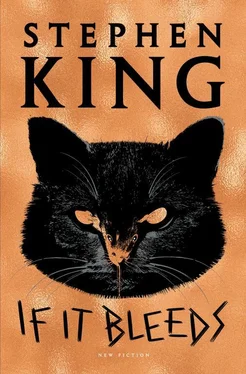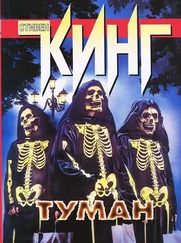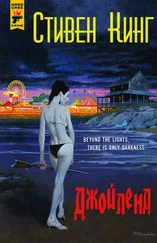He supposed Franzen had had a point about the time before writing a novel actually began. It was a good time, because everything you saw and heard was possible grist for the mill. Everything was malleable. The mind could build a city, remodel it, then raze it, all while you were taking a shower or shaving or having a piss. Once you began, however, that changed. Every scene you wrote, every word you wrote, limited your options a little more. Eventually you were like a cow trotting down a narrow chute with no exit, trotting toward the—
“No, no, it’s not like that at all,” he said, once again startled by the sound of his own voice. “Not like that at all.”
10
Dark came fast in the deep woods. Drew went around turning on the lamps (there were four of them, each shade more awful than the last), and then tackled the answering machine. He listened to his dead father’s message twice, his good old pop who had never, so far as he could recall, said a mean word or raised a hand to his sons (mean words and raised hands had been their mother’s province). It seemed wrong to erase it, but because there was no spare answering machine tape in Pop’s desk, his marching orders from Lucy left him no choice. His recording was brief and to the point: “This is Drew. Please leave a message.”
With that done, he put on his light jacket and went outside to sit on the steps and look at the stars. He was always stunned by how many you could see once you got away from the light pollution of even such a relatively small town as Falmouth. God had spilled a jug of light up there, and beyond the spill was eternity. The mystery of such an extended reality beggared comprehension. A breeze gusted, making the pines sigh in their sorrowful way, and suddenly Drew felt very alone and very small. A shiver went through him and he went back inside, deciding he’d light a small test fire in the stove, just to make sure it wasn’t going to fill the cabin with smoke.
There was a crate flanking each side of the fireplace. One held kindling, probably brought in by Old Bill when he stored his last load of wood under the porch. The other contained toys.
Drew dropped to one knee and rummaged through them. A Wham-O Frisbee, which he vaguely remembered: he, Lucy, and the kids playing four-way out front, laughing it up every time someone skimmed the Frizz into the puckerbrush and had to go get it. A Stretch Armstrong doll he was pretty sure had been Brandon’s, and a Barbie (indecently topless) that had positively been Stacey’s. Other things, though, he either didn’t remember or had never seen before. A one-eyed teddy bear. A deck of Uno cards. A scatter of baseball cards. A game called Pass the Pigs. A top decorated with a circle of monkeys wearing baseball gloves—when he pumped the handle and set it loose, it wobbled drunkenly across the floor and whistled “Take Me Out to the Ball Game.” He didn’t care for this last. The monkeys seemed to wave their gloves up and down as the top spun, as if seeking help, and the tune began to sound vaguely sinister as it wound down.
He looked at his watch before reaching the bottom of the crate, saw it was quarter past eight, and called Lucy back. He apologized for being tardy, saying he’d gotten sidetracked by a box of toys. “I think I recognized Bran’s old Stretch Armstrong—”
Lucy groaned. “Oh God, I used to hate that thing. It smelled so weird .”
“I remember. And a few other things, too, but there’s stuff I could swear I never saw before. Pass the Pigs?”
“Pass the what ?” She was laughing.
“It’s a kids’ game. What about a top with monkeys on it? Plays ‘Take Me Out to the Ball Game.’ ”
“Nope… oh wait a minute. Three or four years ago we rented out the cabin to a family called the Pearsons, remember?”
“Vaguely.” He didn’t at all. If it had been three years ago, he had probably been wrapped up in The Village on the Hill Tied up, more like it. Bound and gagged. Literary S&M.
“They had a little boy, six or seven. Some of the toys must be his.”
“Surprised he didn’t miss them,” Drew said. He was eyeing the teddy bear, which had the piebald look of a toy that had been hugged often and fervently.
“Want to talk to Brandon? He’s here.”
“Sure.”
“Hi, Dad!” Bran said. “You finish your book yet?”
“Very funny. Starting tomorrow.”
“How is it up there? Is it good?”
Drew looked around. The big downstairs room looked mellow in the light of the overheads and the lamps. Even the horrible shades looked okay. And if the stovepipe wasn’t plugged, a little fire would take care of the mild chill.
“Yeah,” he said. “It’s good.”
It was. He felt safe. And he felt pregnant, ready to pop. There was no fear about starting the book tomorrow, only anticipation. The words would pour out, he felt sure of it.
The stove was fine, the pipe open and drawing well. As his little fire burned down to embers, he made up the bed in the master bedroom (a joke; the room was hardly big enough to turn around in) with sheets and blankets that smelled only a trifle stale. At ten o’clock he turned in and lay looking up into the dark, listening to the wind sigh around the eaves. He thought of Old Bill committing suicide in the dooryard, but only briefly, and not with fear or horror. What he felt when he considered the old caretaker’s final moments—the round circle of steel pressing into the underside of his chin, the last sights and heartbeats and thoughts—was not much different than he’d felt looking up at the complex and extravagant sprawl of the Milky Way. Reality was deep, and it was far. It held many secrets and went on forever.
11
He was up early the next morning. He ate breakfast, then called Lucy. She was getting the kids off to school—scolding Stacey because she hadn’t finished her homework, telling Bran he’d left his backpack in the living room—so their conversation was necessarily brief. After the goodbyes, Drew pulled on his jacket and walked down to the brook. The trees on the far side had been logged at some point, opening up a million-dollar view of woods undulating into the distance. The sky was a steadily deepening blue. He stood there for almost ten minutes, enjoying the unassuming beauty of the world around him and trying to empty his mind. To make it ready.
Each semester he taught a bloc of Modern American and Modern British Literature, but because he had been published (and in The New Yorker , no less), his main job was teaching creative writing. He began each class and seminar by talking about the creative process. He told his students that just as most people had a certain routine they followed when they got ready for bed, it was important to have a routine as they prepared for each day’s work session. It was like the series of passes a hypnotist makes as he prepares his subject for the trance state.
“The act of writing fiction or poetry has been compared to dreaming,” he told his students, “but I don’t think that’s entirely accurate. I think it’s more akin to hypnosis. The more you ritualize the preparation, the easier you’ll find it to enter that state.”
He practiced what he preached. When he returned to the cabin, he put on coffee. In the course of his morning, he would drink two cups, strong and black. While he waited for it to brew, he took his vitamin pills and brushed his teeth. One of the renters had shoved his pop’s old desk under the stairs, and Drew decided to leave it there. An odd place to work, perhaps, but strangely cozy. Almost womblike. In his study at home, his last ritualized act before getting to work would have been to straighten his papers into neat piles, leaving an empty space at the left of his printer for fresh copy, but there was nothing on this desk to straighten.
Читать дальше








